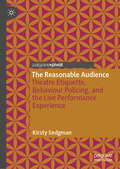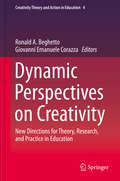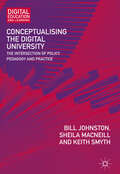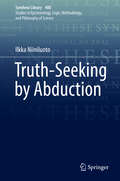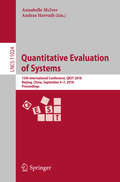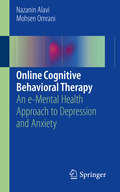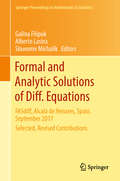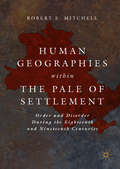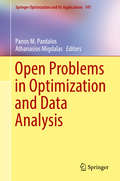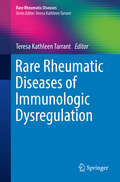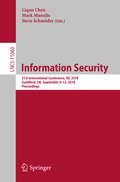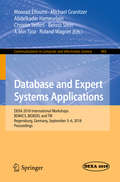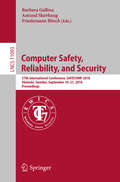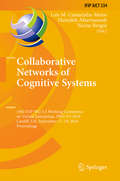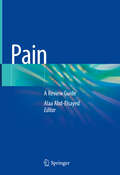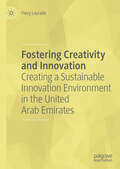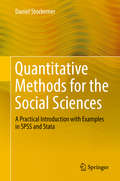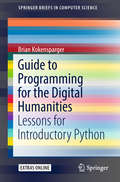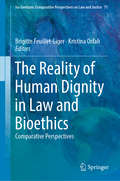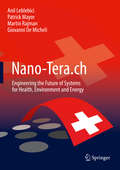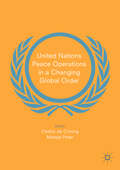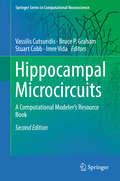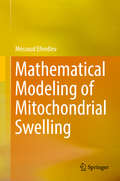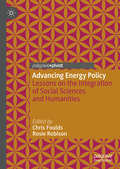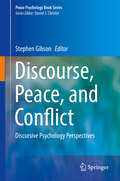- Table View
- List View
The Reasonable Audience: Theatre Etiquette, Behaviour Policing, And The Live Performance Experience
by Kirsty SedgmanAudiences are not what they used to be. Munching crisps or snapping selfies, chatting loudly or charging phones onstage – bad behaviour in theatre is apparently on the rise. And lately some spectators have begun to fight back…The Reasonable Audience explores the recent trend of ‘theatre etiquette’: an audience-led crusade to bring ‘manners and respect’ back to the auditorium. This comes at a time when, around the world, arts institutions are working to balance the traditional pleasures of receptive quietness with the need to foster more inclusive experiences. Through investigating the rhetorics of morality underpinning both sides of the argument, this book examines how models of 'good' and 'bad' spectatorship are constructed and legitimised. Is theatre etiquette actually snobbish? Are audiences really more selfish? Who gets to decide what counts as ‘reasonable’ within public space?Using theatre etiquette to explore wider issues of social participation, cultural exclusion, and the politics of identity, Kirsty Sedgman asks what it means to police the behaviour of others.
Dynamic Perspectives on Creativity: New Directions For Theory, Research, And Practice In Education (Creativity Theory and Action in Education #4)
by Ronald A. Beghetto Giovanni Emanuele CorazzaThis edited volume provides a venue for scholars whose work challenges the typical, static conceptions, and methods of studying creativity. More specifically, the book will serve as an effort to introduce more dynamic definitions, conceptions, and approaches for studying creativity in the context of educational practice. By doing so, it feeds the strong contemporary need for more dynamic conceptions of creativity in educational settings. This is particularly important given the fast evolution of modern society and the widespread consensus that efforts to develop creative potential should be democratized -- extending well beyond the boundaries of the gifted subset and the walls of the classroom. This work recognizes that more dynamic perspectives on creativity are necessary for understanding its complexity, value, and meaning in educational contexts.
Conceptualising the Digital University: The Intersection of Policy, Pedagogy and Practice (Digital Education and Learning)
by Bill Johnston Sheila MacNeill Keith SmythDespite the increasing ubiquity of the term, the concept of the digital university remains diffuse and indeterminate. This book examines what the term 'digital university' should encapsulate and the resulting challenges, possibilities and implications that digital technology and practice brings to higher education. Critiquing the current state of definition of the digital university construct, the authors propose a more holistic, integrated account that acknowledges the inherent diffuseness of the concept. The authors also question the extent to which digital technologies and practices can allow us to re-think the location of universities and curricula; and how they can extend higher education as a public good within the current wider political context. Framed inside a critical pedagogy perspective, this volume debates the role of the university in fostering the learning environments, skills and capabilities needed for critical engagement, active open participation and reflection in the digital age. This pioneering volume will be of interest and value to students and scholars of digital education, as well as policy makers and practitioners.
Truth-Seeking by Abduction (Synthese Library #400)
by Ilkka NiiniluotoThis book examines the philosophical conception of abductive reasoning as developed by Charles S. Peirce, the founder of American pragmatism. It explores the historical and systematic connections of Peirce's original ideas and debates about their interpretations. Abduction is understood in a broad sense which covers the discovery and pursuit of hypotheses and inference to the best explanation. The analysis presents fresh insights into this notion of reasoning, which derives from effects to causes or from surprising observations to explanatory theories.The author outlines some logical and AI approaches to abduction as well as studies various kinds of inverse problems in astronomy, physics, medicine, biology, and human sciences to provide examples of retroductions and abductions. The discussion covers also everyday examples with the implication of this notion in detective stories, one of Peirce’s own favorite themes.The author uses Bayesian probabilities to argue that explanatory abduction is a method of confirmation. He uses his own account of truth approximation to reformulate abduction as inference which leads to the truthlikeness of its conclusion. This allows a powerful abductive defense of scientific realism. This up-to-date survey and defense of the Peircean view of abduction may very well help researchers, students, and philosophers better understand the logic of truth-seeking.
Quantitative Evaluation of Systems: 15th International Conference, QEST 2018, Beijing, China, September 4-7, 2018, Proceedings (Lecture Notes in Computer Science #11024)
by Annabelle McIver Andras HorvathThis book constitutes the proceedings of the 15th International Conference on Quantitative Evaluation Systems, QEST 2018, held in Beijing, China, in September 2018. The 24 full papers presented were carefully reviewed and selected from 51 submissions. The papers cover topics in the field of quantitative evaluation and verification of computer systems and networks through stochastic models and measurements emphasizing two frontier topics in research: quantitative information flow for security and industrial formal methods.
Online Cognitive Behavioral Therapy: An E-mental Health Approach to Depression and Anxiety
by Nazanin Alavi Mohsen OmraniThis book aims to provide the clinicians with details of online cognitive behavioral therapy (CBT) to facilitate care delivery for patients struggle with depression and anxiety. Chapters cover some of the most fundamental concepts for successful treatment, including experiments, action plans evidence, and the guidelines for managing, thoughts, feelings, and other key concerns. Designed to be a reader-friendly guide, each chapter opens with a summary of the content and a recap of concepts covered in previous sections, making this highly functional for individual chapter or whole book use. Each chapter also includes recommended tables and chart to facilitate the documentation of each recommended session, making this highly practical resource a vital tool for those who treat patients suffering from these particular mental health concerns.
Formal and Analytic Solutions of Diff. Equations: Fasdiff, Alcalá De Henares, Spain, September 2017, Selected, Revised Contributions (Springer Proceedings in Mathematics & Statistics #256)
by Sławomir Michalik Alberto Lastra Galina FilipukThese proceedings provide methods, techniques, different mathematical tools and recent results in the study of formal and analytic solutions to Diff. (differential, partial differential, difference, q-difference, q-difference-differential.... ) Equations. They consist of selected contributions from the conference "Formal and Analytic Solutions of Diff. Equations", held at Alcalá de Henares, Spain during September 4-8, 2017. Their topics include summability and asymptotic study of both ordinary and partial differential equations. The volume is divided into four parts. The first paper is a survey of the elements of nonlinear analysis. It describes the algorithms to obtain asymptotic expansion of solutions of nonlinear algebraic, ordinary differential, partial differential equations, and of systems of such equations. Five works on formal and analytic solutions of PDEs are followed by five papers on the study of solutions of ODEs. The proceedings conclude with five works on related topics, generalizations and applications. All contributions have been peer reviewed by anonymous referees chosen among the experts on the subject.The volume will be of interest to graduate students and researchers in theoretical and applied mathematics, physics and engineering seeking an overview of the recent trends in the theory of formal and analytic solutions of functional (differential, partial differential, difference, q-difference, q-difference-differential) equations in the complex domain.
Human Geographies Within the Pale of Settlement: Order And Disorder During The Eighteenth And Nineteenth Centuries
by Robert E. MitchellThis study suggests how traditional language-rich narrative histories of the Pale of Settlement can benefit from drawing on the large vocabularies, questions, theories and analytical methods of human geography, economics and the social sciences for an understanding of how Jewish communities responded to multiple disruptions during the nineteenth century. Moving from the ecological level of systems of settlements and variations among individual ones down to the immediate built environment, the book explores how both physical and human space influenced responses to everyday lives and emigration to America.
Open Problems in Optimization and Data Analysis (Springer Optimization and Its Applications #141)
by Panos M. Pardalos Athanasios MigdalasComputational and theoretical open problems in optimization, computational geometry, data science, logistics, statistics, supply chain modeling, and data analysis are examined in this book. Each contribution provides the fundamentals needed to fully comprehend the impact of individual problems. Current theoretical, algorithmic, and practical methods used to circumvent each problem are provided to stimulate a new effort towards innovative and efficient solutions. Aimed towards graduate students and researchers in mathematics, optimization, operations research, quantitative logistics, data analysis, and statistics, this book provides a broad comprehensive approach to understanding the significance of specific challenging or open problems within each discipline. The contributions contained in this book are based on lectures focused on “Challenges and Open Problems in Optimization and Data Science” presented at the Deucalion Summer Institute for Advanced Studies in Optimization, Mathematics, and Data Science in August 2016.
Rare Rheumatic Diseases of Immunologic Dysregulation (Rare Rheumatic Diseases)
by Teresa Kathleen TarrantThis book is a practical, user-friendly guide for diagnosing and treating patients with rare rheumatic diseases of immunologic dysregulation. Covering uncommon diseases such as IgG4-Related Disease, Castleman’s Disease, and Felty Syndrome, chapters aggregate information from case reports and anecdotal literature to create a single, comprehensive handbook for treating patients. Each chapter provides historical perspective and epidemiology; a literature review (including research trials, translational research, historical and current case reports, and case series); pathogenesis; clinical presentation; laboratory evaluation; imaging; histopathology; treatment; and outcomes. Rare Rheumatic Diseases of Immunologic Dysregulation is an invaluable resource for rheumatologists, rheumatology fellows, and clinical immunologists to better diagnose and treat patients with rare rheumatic diseases.
Information Security: 21st International Conference, ISC 2018, Guildford, UK, September 9–12, 2018, Proceedings (Lecture Notes in Computer Science #11060)
by Liqun Chen Mark Manulis Steve SchneiderThis book constitutes the proceedings of the 21st International Conference on Information Security, ISC 2018, held in Guildford, UK, in September 2018. The 26 full papers presented in this volume were carefully reviewed and selected from 59 submissions. The book also includes one invited talk in full-paper length. The papers were organized in topical sections named: software security; symmetric ciphers and cryptanalysis; data privacy and anonymization; outsourcing and assisted computing; advanced encryption; privacy-preserving applications; advanced signatures; and network security.
Database and Expert Systems Applications: DEXA 2018 International Workshops, BDMICS, BIOKDD, and TIR, Regensburg, Germany, September 3–6, 2018, Proceedings (Communications in Computer and Information Science #903)
by Mourad Elloumi Michael Granitzer Abdelkader Hameurlain Christin Seifert Benno Stein A Min Tjoa Roland WagnerThis volume constitutes the refereed proceedings of the three workshops held at the 29th International Conference on Database and Expert Systems Applications, DEXA 2018, held in Regensburg, Germany, in September 2018: the Third International Workshop on Big Data Management in Cloud Systems, BDMICS 2018, the 9th International Workshop on Biological Knowledge Discovery from Data, BIOKDD, and the 15th International Workshop on Technologies for Information Retrieval, TIR.The 25 revised full papers were carefully reviewed and selected from 33 submissions. The papers discuss a range of topics including: parallel data management systems, consistency and privacy cloud computing and graph queries, web and domain corpora, NLP applications, social media and personalization
Computer Safety, Reliability, and Security: 37th International Conference, SAFECOMP 2018, Västerås, Sweden, September 19-21, 2018, Proceedings (Lecture Notes in Computer Science #11093)
by Barbara Gallina Amund Skavhaug Friedemann BitschThis book constitutes the refereed proceedings of the 37th International Conference on Computer Safety, Reliability, and Security, SAFECOMP 2018, held in Västerås, Sweden, in September 2018. The 19 revised full papers and 1 short paper presented together with three abstracts of keynotes were carefully reviewed and selected from 63 submissions. The papers are organized in topical sections on Automotive Safety Standards and Cross-domain Reuse Potential; Autonomous Driving and Safety Analysis; Verification; Multi-concern Assurance; Fault Tolerance; and Safety and Security Risk.
Collaborative Networks of Cognitive Systems: 19th IFIP WG 5.5 Working Conference on Virtual Enterprises, PRO-VE 2018, Cardiff, UK, September 17-19, 2018, Proceedings (IFIP Advances in Information and Communication Technology #534)
by Luis M. Camarinha-Matos Hamideh Afsarmanesh Yacine RezguiThis book constitutes the refereed proceedings of the 19th IFIP WG 5.5 Working Conference on Virtual Enterprises, PRO-VE 2018, held in Cardiff, UK, in September 2018. The 57 revised full papers were carefully reviewed and selected from 143 submissions. They provide a comprehensive overview of identified challenges and recent advances in various collaborative network (CN) domains and their applications, with a strong focus on the following areas: blockchain in collaborative networks, industry transformation and innovation, semantics in networks of cognitive systems, cognitive systems for resilience management, collaborative energy services in smart cities, cognitive systems in agribusiness, building information modeling, industry 4.0 support frameworks, health and social welfare services, risk, privacy and security, collaboration platform issues, sensing, smart and sustainable enterprises, information systems integration, dynamic logistics networks, collaborative business processes, value creation in networks, users and organizations profiling, and collaborative business strategies.
Pain: A Review Guide
by Alaa Abd-ElsayedThis concise but comprehensive guide covers common procedures in pain management necessary for daily practice, and includes topics on international pain medicine curricula, for example, the American Board of Anesthesiology, World Institute of Pain/Fellow of Interventional Pain Practice, and American Board of Pain Medicine. Treatments for pain are discussed, including nerve blocks (head, neck, back, pelvis and lower extremity). Chapters have a consistent format including high yield points for exams, and questions in the form of case studies. Pain: A Review Guide is aimed at trainees in pain medicine all over the world. This book will also be beneficial to all practitioners who practice pain.
Fostering Creativity and Innovation: Creating a Sustainable Innovation Environment in the United Arab Emirates
by Flevy LasradoCompiling best practices and original research, this book examines the factors that influence the sustainability of creativity and innovation in organisations and proposes a toolkit to assess gaps within existing strategy. Focusing particularly on the United Arab Emirates (UAE), the author offers practical suggestions for improving and enhancing innovation, and ultimately achieving results. Both creativity and innovation have become pillars for leveraging competitive advantage in recent years, and therefore this book is a vital read for anyone engaged in ensuring sustainable development in organisations, particularly those within the Middle East.
Quantitative Methods for the Social Sciences: A Practical Introduction with Examples in SPSS and Stata
by Daniel StockemerThis textbook offers an essential introduction to survey research and quantitative methods. Building on the premise that statistical methods need to be learned in a practical fashion, the book guides students through the various steps of the survey research process and helps to apply those steps toward a real example. In detail, the textbook introduces students to the four pillars of survey research and quantitative analysis: (1) the importance of survey research, (2) preparing a survey, (3) conducting a survey and (4) analyzing a survey. Students are shown how to create their own questionnaire based on some theoretically derived hypotheses to achieve empirical findings for a solid dataset. Lastly, they use said data to test their hypotheses in a bivariate and multivariate realm. The book explains the theory, rationale and mathematical foundations of these tests. In addition, it provides clear instructions on how to conduct the tests in SPSS and Stata. Given the breadth of its coverage, the textbook is suitable for introductory statistics, survey research or quantitative methods classes in the social sciences.
Guide to Programming for the Digital Humanities: Lessons For Introductory Python (SpringerBriefs in Computer Science)
by Brian KokenspargerAs an introduction to programming for the Digital Humanities (DH), this book presents six key assignments oriented on DH topics. The topics include Computing Change Over Time (calculating burials at a historic cemetery), Visualizing Change Over Time (visualizing the burials at the historic cemetery), Textual Analysis (finding word frequencies and “stop words” in public domain texts), XML Transformation (transforming a simplified version of XML into HTML styled with CSS), Stylometry (comparing the measured features of graphic images), and Social Network Analysis (analyzing extended relationships in historic circles). The book focuses on the practical application of these assignments in the classroom, providing a range of variations for each assignment, which can be selected on the basis of students’ specific programming background and skills; “atomic” assignments, which can be used to give students the experience they need to successfully complete the main assignments; and some common pitfalls and gotchas to manage in the classroom. The book’s chief goals are to introduce novice computer science (CS) students to programming for DH, and to offer them valuable hands-on experience with core programming concepts.
The Reality of Human Dignity in Law and Bioethics: Comparative Perspectives (Ius Gentium: Comparative Perspectives on Law and Justice #71)
by Brigitte Feuillet-Liger Kristina OrfaliAdopting an interdisciplinary perspective, this volume explores the reality of the principle of human dignity – a core value which is increasingly invoked in our societies and legal systems. This book provides a systematic overview of the legal and philosophical concept in sixteen countries representing different cultural and religious contexts and examines in particular its use in a developing case law (including of the European Court of Human Rights and of the Inter-American Court of Human Rights). Whilst omnipresent in the context of bioethics, this book reveals its wider use in healthcare more generally, treatment of prisoners, education, employment, and matters of life and death in many countries. In this unique comparative work, contributing authors share a multidisciplinary analysis of the use (and potential misuse) of the principle of dignity in Europe, Africa, South and North America and Asia. By revealing the ambivalence of human dignity in a wide range of cultures and contexts and through the evolving reality of case law, this book is a valuable resource for students, scholars and professionals working in bioethics, medicine, social sciences and law. Ultimately, it will make all those who invoke the principle of human dignity more aware of its multi-layered character and force us all to reflect on its ability to further social justice within our societies.
Nano-Tera.ch: Engineering the Future of Systems for Health, Environment and Energy
by Anil Leblebici Patrick Mayor Martin Rajman Giovanni De MicheliThis book presents the overall vision and research outcomes of Nano-Tera.ch, which is a landmark Swiss federal program to advance engineering system and device technologies with applications to Health and the Environment, including smart Energy generation and consumption. The authors discuss this unprecedented nation-wide program, with a lifetime of almost 10 years and a public funding of more than 120 MCHF, which helped to position Switzerland at the forefront of the research on multi-scale engineering of complex systems and networks, and strongly impacted the Swiss landscape in Engineering Sciences.
United Nations Peace Operations in a Changing Global Order
by Mateja Peter Cedric De ConingThis open access book explores how UN peace operations are adapting to four transformational trends in the changing global order: (1) the rebalancing of relations between states of the global North and the global South; (2) the rise of regional organisations as providers of peace; (3) the rise of violent extremism and fundamentalist non-state actors; and (4) increasing demands from non-state actors for greater emphasis on human security. It identifies emerging conflict and peace trends (robustness of responses, rise of non-state threats, cross-state conflicts) and puts them in the context of tectonic shifts in the global order (rise of emerging powers, North–South rebalancing, emergence of regional organisations as providers of peace). The volume stimulates a discussion between practitioners and academics from the global North and South, and offers an analysis of how the international community collectively makes sense of the changing global order and its implications for UN peace operations.
Hippocampal Microcircuits: A Computational Modeler's Resource Book (Springer Series in Computational Neuroscience #5)
by Vassilis Cutsuridis Bruce P. Graham Stuart Cobb Imre VidaThis is the 2nd edition of a very well received and popular book that reflects the current state-of-the-art of the ongoing research avenues concerning the hippocampus and processing units bridging the gap between single cell activity, network activity and global brain function. It aims to provide a methodology to anyone interested in developing microcircuit level models of the hippocampus. <P><P> The book is divided into two thematic areas: (I) Experimental background and (II) Computational analysis. In part I, leading experimental neuroscientists discuss the morphological, physiological and molecular characteristics as well as the connectivity and synaptic properties of the various cell types found in the hippocampus. Behaviour-related ensemble activity patterns of morphologically identified neurons in anesthetized and freely moving animals provide insights on the function of the hippocampal areas. In part II, computational neuroscientists present models of the hippocampal microcircuits at various levels of detail (e.g. single cell level, network level, etc.). Synaptomics and connectomics models of hippocampal structures are initially discussed. Then, network models of memory, rhythm generation and spatial navigation are presented, followed by abstract and biophysical models of synaptic plasticity. Network models of hippocampal implicated disorders (epilepsy and schizophrenia) are then detailed and how their network topologies, connectivities and activities change in these diseases. Finally, two chapters are dedicated to describing simulator environments of single neurons and networks currently used by computational neuroscientists in developing their models and modelling tools to parametrically constrain them. <P><P> This engaging volume is invaluable to experimental and computational neuroscientists, electrical engineers, physicists, mathematicians and others interested in developing microcircuit models of the hippocampus. Graduate level students and trainees in all of these fields can find this book a significant source of information.
Mathematical Modeling of Mitochondrial Swelling
by Messoud EfendievThe mathematical models considered in this book can help to understand the swelling of mitochondria. For the first time, it presents new mathematical models of mitochondrial swelling that take into account, in particular, spatial effects. The results presented here could make it possible to predict properties of the underlying biological mechanisms. Taking into account that mitochondria could move within a cell, lead to a PDE-PDE model. The book discusses the well-posedness and long-term dynamics of solutions, depending on boundary conditions reflecting the in vitro and in vivo cases. These analytical and numerical results have inspired colleagues from the Institute of Pharmacology and Toxicology of the Helmholtz Center Munich to design new experiments justifying the theoretical and numerical results that are obtained. The book is intended for graduates students and researchers with a solid mathematical background and an interest in cell biology.
Advancing Energy Policy: Lessons on the integration of Social Sciences and Humanities
by Chris Foulds Rosie RobisonThis open access book advocates for the Social Sciences and Humanities to be more involved in energy policymaking. It forms part of the European platform for energy-related Social Sciences and Humanities’ activities, and works on the premise that crossing disciplines is essential. All of its contributions are highly interdisciplinary, with each chapter grounded in at least three different Social Sciences and Humanities disciplines. These varying perspectives come together to cover an array of issues relevant to the energy transition, including: energy poverty, justice, political ecology, governance, behaviours, imaginaries, systems approaches, modelling, as well as the particular challenges faced by interdisciplinary work. As a whole, the book presents new ideas for future energy policy, particularly at the European level. It is a valuable resource for energy researchers interested in interdisciplinary and society-relevant perspectives. Those working outside the Social Sciences and Humanities will find this book an accessible way of learning more about how these subjects can constructively contribute to energy policy.
Discourse, Peace, and Conflict: Discursive Psychology Perspectives (Peace Psychology Book Series)
by Stephen GibsonThis first-of-its-kind volume brings discursive psychology and peace psychology together in a compelling practical synthesis. An array of internationally-recognised contributors examine multiple dimensions of discourse—official and casual, speech, rhetoric, and text—in creating and maintaining conflict and building mediation and reconciliation. Examples of strategies for dealing with longstanding conflicts (the Middle East), significant flashpoints (the Charlie Hebdo case), and current heated disputes (the refugee ‘crisis’ in Europe) demonstrate discursive methods in context as they bridge theory with real life. This diversity of subject matter is matched by the range of discursive approaches applied to peace psychology concepts, methods, and practice.Among the topics covered: Discursive approaches to violence against women.The American gun control debate: a discursive analysis.Constructing peace and violence in the Palestinian-Israeli conflict.Discursive psychological research on refugees. Citizenship, social injustice, and the quest for a critical social psychology of peace.The emotional and political power of images of suffering: discursive psychology and the study of visual rhetoric. Discourse, Peace, and Conflict offers expansive ideas to scholars and practitioners in peace psychology, as well as those in related areas such as social psychology, political psychology, and community psychology with an interest in issues pertaining to peace and conflict.
